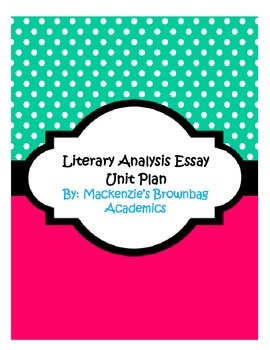It's a good question really.
Why do we need to talk about literary devices? Shouldn't the writing speak for itself? What if the author didn't really mean to make it metaphorical, ironic, etc.?
Good questions of course but probably moot. In class, weren't not wondering whether or not the author meant to use those specific rhetorical devices. We're investigating...
if they did, what does it mean?
That's the real bread and butter of teaching literary device analysis. Why and how do authors say something the way they say it... does that make sense? It does in my head. If it doesn't, just say it out loud. *trust me* That's the fun in analyzing literature!
So here are some tips for teaching literary device/rhetorical device analysis to your high school and college students:
- First read. Should be obvious but we all know students don't read from time-to-time. I suggest doing a reading activity in class (all together, partners, individual reading, etc.), but just make sure they've read the material. It'll be way easier to have the lit terms discush once they have read.
- Look for patterns. Review that a literary device is used to help an author get his/her point across in a unique way - that's about as specific you can get when talking in general about literary terms. Then, examine the patterns in the piece. Do they use the same phrase a lot? BAM Repetition! Maybe even parallelism if you're lucky. Do they use the words "like" or "as"? Not always a simile but it's a place that students feel comfortable starting. Can you picture a scene vividly in your mind? Imagery! These are VERY basic literary terms. The more specific you go with lit devices, the more specific you will need to be in your discussions.
- Focus on the WHY & HOW. The big question to look at when talking about literary terms is why or how did the author say what s/he said? Remind students to stay away from what did the author say. This gets into the summary zone which is cool if that's what you're going for. Discussing the why and how questions will lend students to break down information at the document-level, paragraph-level, sentence-level, and word-level. That's the key in analysis!
These should get you started! If you don't know where to start with your analysis, check out my LITERARY ANALYSIS ESSAY UNIT PLAN. The unit is designed for teachers who need everything and they need it now!
WHAT IS INCLUDED?
- Instructor Guide - how to use the unit plan
- Suggested Unit Plan - what to do each day, step-by-step
- Literary Analysis Essay Prompt - simplified & organized
- Suggested Readings - with links, summaries, & suggested rhetorical devices to discuss
- Rhetorical Devices Bookmark - for student use
- Guided Reading Activity (with answers) - to practice analyzing rhetorical devices
- Individual Student Notesheet - for students to break down examples & analyze rhetorical devices
- Outlining Instructions - how to outline for this specific essay step-by-step
- Essay Scoring Guide & Teacher Instructions - fast & efficient scoring guide/rubric for teachers with instructions to help save time!
What have your experiences been with teaching literary terms? What have you found that works?

No comments:
Post a Comment